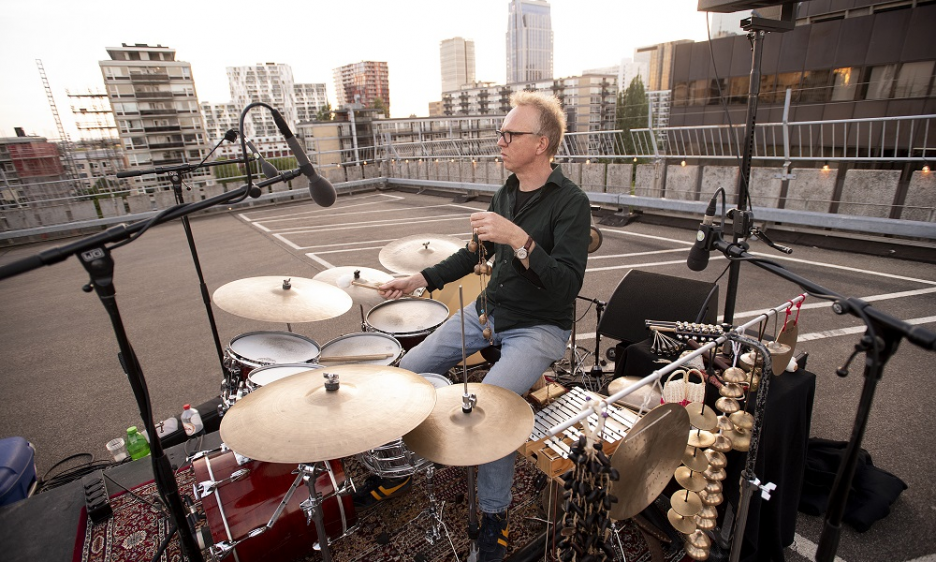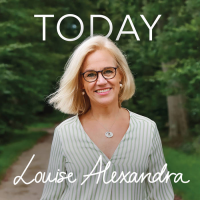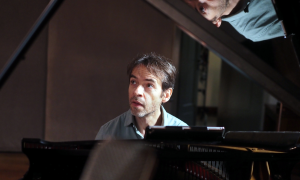Home » Jazz Articles » Interview » Joost Lijbaart: Free Conversations With Myself
Joost Lijbaart: Free Conversations With Myself

Courtesy Isa Leijdekkers
The music is without a beginning and an ending—it’s basically in the moment. You just dive into something and you see what happens. I really love that. It’s really shameless in a way.
—Joost Lijbaart, drummer, percussionist, composer.
For the average music fan, it seems almost inconceivable that a professional musician could become tired of making music. Travelling the world, basking in the adulation of audiences, and above all, the magic of music-making—how could one tire of that? And yet, that is precisely the situation Lijbaart found himself facing in the summer of 2014. After three deacdes of touring the world Lijbaart hit something of a wall.
Under The Surface
"I was a bit in some kind of personal crisis then," says the Dutch drummer and percussionist. "I was kind of tired of making music and trying to get gigs. All the effort didn't seem to go anywhere. I was even thinking of giving up music and doing something else for a living."That potential 'something else' was photography and filming, but the sober advice of friends put the brakes on Lijbaart's wavering. "They told me 'Forget it. You're too old for that. Don't do it.' In the autumn things started to happen and I thought, 'I'm a drummer.' I just wanted to go on."
In was in that same summer of 2014 that the idea for a solo album first came about. The project was just as quickly put on the backburner, however, when Lijbaart was drawn into an exciting new project. A call from vocalist Sanne Rambags for a gig was the spark that ignited Under The Surface, a trio—also featuring multi-instrumentalist Bram Stadhouders—that would play over 160 fully improvised gigs on four continents over the next five years.
The trio's outstanding eponymous debut came out on Challenge Records, the same label with which Lijbaart recorded the award-winning albums Desire (2015), Goldbrun (2017) and Bluebeard (2020) with the Yuri Honing Acoustic Quartet. Having come close to hanging up his sticks just a few short years before, Lijbaart found himself touring the world as never before and the idea for a solo album went on hold. "I was just so busy," says Lijbaart.
The extensive touring around Europe, back and forth to China and Japan, from Iran to South Africa, from India to South Korea, from Colombia and Russia to Mali—and many points in between—saw Lijbaart add significantly to his collection of Asian, African and classical percussion instruments. He may not have been aware of it at the time, but his foraging for new sounds was laying the groundwork for the solo album. All that was needed was the right time and right frame of mind.
Pause For Thought
The stars aligned in the most unexpected way when the global shock of COVID-19 knocked the world off its axis. The downside of lockdown was that Lijbaart lost seventy gigs. Tours to Australia, Indonesia, Canada, the United States and the UK with the Yuri Honing Quartet—the fruit of two-years' work—were postponed. On the upside, Lijbaart took the dust covers off his solo project. "This summer the idea came back. I dug up my older ideas and moved myself to my practise room. I started playing and having conversations with myself. I worked on some new compositions and the idea became clearer."Free represents Lijbaart's journey—the musical and cultural experiences accumulated over thirty years of touring internationally, and an inner journey that has come into sharper focus during the COVID-19 lockdowns. Asia sonorities, African and Indian rhythms, classical percussion, modal influences and an introspective minimalism— sombre yet hauntingly beautiful—all color the music on this, his most personal album to date.
In The Shadow Of Giants
In effect, however, the seeds of Free go back many years to the 1980s when Lijbaart was studying classical percussion at the Conservatory in Amsterdam. "I was listening to a lot of solo drum albums then. I checked out Tony Oxley's solo album. Pierre Favre, Max Roach, Art Blakey, Jack DeJohnette's Pictures, so I already had an idea that it would be interesting to make a solo album using the whole world of percussion instruments. But I was in my early twenties and I didn't feel really secure, mainly because of the composing part. I thought, 'I'm not really a great composer.'It has taken time, a long time, for Lijbaart to build the confidence to create Free, but the results are beguiling.
The Conscious And Unconscious Mind...
A key component of Free is the presence of harmonium, which combined with the dreamlike, ethereal quality of much of the music, evokes the meditative world of an Indian alap. "I listen to a lot of music, Indian music, West African music, Central Asian music, Scandinavian music," explains Lijbaart, "but Indian music, especially the ragas of northern India is very much melodic information in a scale."On several tunes, like "Interstellar," I'm working with just one melodic idea. I'm working with a melody of three or four notes and at a certain pint the key changes either in minor or major or in flat seven. In jazz you normally play all the chords all the time but I thought in a more linear way of composing, you play one note, two notes, and in Indian music it takes a really long time, it can be forty five minute before they then come up with a major seventh, so that part was an Indian part."
Further Indian influence can also be felt on the album's final track, "Free," which Lijbaart had previously recorded with his quartet Batik. "This time I tried to make it more modal in a way, with the drone, which is also an Indian thing," explains Lijbaart. "The Indian influence is there in the melodic part—I just thought of a scale with one twist, which is basically what I do quite a lot. So, for sure, Indian music was an influence."
The balfon brings a flavour of West Africa to the short but bustling "Niaga," a composition born of stirred memories. "Niaga is a small village in Senegal, about one hour from Dakkar. I was there in 1988 with a percussion group from The Hague. We stayed there for four weeks and learned how to play the djembe and the sabar."
When Lijbaart was working out his ideas for Free he found himself playing a fast 5/8 rhythm. It was only later, on listening back to his playing that he recognized its provenance. "I thought, 'Hey, this is actually a rhythm we learned back then in Niaga.' So that was thirty years somewhere in the subconscious. Sometimes I play 5/8 but not like this."
West African rhythms also permeate "Half Moon," named after the shape of the Niger river. On this track Lijbaart uses not one but two balfons. "I tried the small balafon but then I rented a much bigger one, which was better tuned and has a lower sound. So, you hear two balafon patterns that I wove together. I liked it so much that I bought it after the recording." With its bird calls, rustling shells and sounds of water fusing with shaker pulse and bubbling rhythms, "Half Moon" is a highly evocative mood piece. The lack of overt melodic lines, and the layers of intertwining percussion and hypnotic rhythms evoke Miles Davis's first electric period, which Lijbaart readily acknowledges.
"I really love the Miles' period from 1970 to 1973-'74. It influenced me very much. It's not about a melody, it's more about an organic, moving thing, and that's really how I like to play. The music is without a beginning and an ending—it's basically in the moment. You just dive into something and you see what happens. I really love that. It's really shameless in a way."
It is an approach, Lijbaart recognizes, that he has learned to embrace more deeply playing in Under the Surface with Stadhouders and Ramberg. "There is never the urge to please the audience, it is just about playing what matters. That gave me the confidence to think, 'Ok, what really matters?'"
In addition to his set-up of five toms, bass drum, snare, and three sets of tuned gongs for this album, Lijbaart also plays Indonesia and Bolivian percussion, Japanese odaiko drums and, on "Saman," Native American flute. The music, with its subconscious rhythms and stylistic choices is a sonic map of Lijbaart's journey to date. There are also, it transpires, much deeper journeys running within.
Unlocking in Lockdown
"When the lockdown started on the 13th March I was in shock, like we all were. For the past thirty years I have been touring and traveling and when I wasn't doing that, I was arranging it again. Then we were in a very insecure time, and I thought, 'Who am I, actually?' If I'm not performing, I am nothing. I am just a human being. I'm eating and breathing but I am nothing," Lijbaart says with a disarming frankness that hints at nothing less than an existential crisis. Fortunately, Lijbaart came through this period of soul-searching with renewed focus."I discovered actually that this is not true. I am still the same person and I discovered that I could be quite happy, with my kids and my wife. We try to make the best out of it. So, looking inside myself, I found quite a lot of happiness. It is horrible that people were dying every day, of course, and people losing their jobs, but I could still find happiness, just walking for an hour every evening in the fields."
The pause for metaphorical deep breath and self-examination that lockdown brought also enabled Lijbaart to come more fully to terms with the loss of his father, Piet, who died of cancer aged 37 when Lijbaart was just two. "I also thought why did I never confront myself with the fact that my father passed away so young? What am I afraid of?"
Lijbaart's father was a drummer, and by all accounts a very good one at that. He played in a band called the New Orleans Seven, though Lijbaart discovered from his father's record collection that he had been much more into modern jazz, like Eric Dolphy. "This year on the 9th January it was fifty years ago that he passed away, so for me it was some kind of moment to look inside," Lijbaart explains.
"I thought more about him, I looked at old pictures. I discovered some interesting things. It's about accepting yourself and the way you are. It's okay, it's nothing to worry about. My father is okay, he's in me. That is what I feel more and more. Finally, I could feel him in a certain way. The album had a lot to do with reflection, the touring, all the countries and to reflect on myself."
Schools Of Thought
Lijbaart took up the drums aged seven, though his first lessons were in classical percussion, which he studied until his mid-teens. "I played a lot of twentieth century modern classical music like John Cage, Steve Reich, Xenakis, Philip Glass, which you can also feel a bit on the album."It was Lijbaart's love of jazz that took him down a different path. "I went to the Conservatory because I wanted to be a drummer. I was very much into jazz." Lijbaart spent five years in the Hilversum Conservatory, studying with Cees Kranenburg, Marcel Serierse, Ali Un D'Aye Rose and Victor Oskam. It was a chance meeting, one year before entering the Conservatory, however, that was to have the greatest impact on Lijbaart's musical development.
One Friday night like any other, while strolling through the small village of Hilversum, close to Amsterdam, Lijbaart heard the strains of Dave Brubeck's "Take Five" coming from a café. Lijbaart stopped to listen. He recognized the drummer from the music school where he was studying at the time, but not the other musicians. The young saxophonist was Yuri Honing. Afterwards, the musicians chatted and decided to form a jazz band They rehearsed twice a week, immersing themselves in jazz standards. Thus, began the musical partnership between Honing and Lijbaart that has taken them around the world many times over.
"We have known each other since 1985. It's like any long-term relationship," says Lijbaart, "but I am a person who likes long-term relationships. I'm also together with my wife for twenty-three years. I'm not really a quitter." The formula for a successful long-term partnership, Lijbaart rationalizes, is to carve out and maintain a degree of independence.
Freedom, Dreams, Steps
"What I have learned is that it is important to live your own dream. It's great to work together but I think it's also very important to have separate projects going. Real creativity can only grow in total freedom. It's key in fact."To that end, Lijbaart has concurrently been involved in a number of other projects, such as his duos with vocalist/percussionist Sanne Huijbregts, saxophonist Kika Sprangers and pianist Wolfert Brederode, the latter of which has been active since 2005. Then there are the quartet Batik and the globe-trotting trio Under The Surface. These collaborations have allowed Lijbaart to stretch himself musically, and to play in new parts of the world, namely Africa, which had long been a dream.
"I have performed in almost 100 countries now, but I arranged almost everything myself. The reason I have succeeded in that is basically because I want it. With Under The Surface we did a huge central Asia tour in Kyrgyzstan, Turkey, Egypt, China and Tajikistan in just one crazy month. If I can dream it then I know what kind of steps I need to take to make it happen. It's work but I was super-motivated to do it. You need to be honest with yourself and honest with each other."
The Business of Identity
Having learned first-hand how to build and sustain an international career Lijbaart is well placed to pass on the wisdom of his experience. To this end, he teaches entrepreneurship in the music Conservatories of Groningen, Amsterdam and Tilburg. "A three-step rocket" is how Lijbaart describes the program he has developed for students."What I try to do is to inspire the students and give them the feeling that they can do it," says Lijbaart. "One big thing is building your own identity, so it is very important to know why you do certain things because then you have contact with your inner self and you find your motor to do what you want. And you need to do it all the time.
"The second thing is skills. You need to have a lot of different things going on: how do you write a biography; how to build a website; how to make a good phone call; how to present yourself in a visual style with images and photos.
"The third thing is that I try to teach them to switch from a fixed mindset to a growing mindset. The fixed mindset is the biggest enemy of everything—'things are like this and it is impossible to change them.' It's not like that. Basically, this third part is mental coaching. I have read quite a lot of books about entrepreneurship and been to seminars. I have learned quite a lot in the last ten years. It is important to ask yourself, 'What makes me really happy?' It helps you make better choices. Better musical choices and better projects."
Being, Giving
Composing and recording the music for Free has been a liberating experience for Lijbaart. "It was a musical journey, but it was also a spiritual journey. I discovered a lot of new aspects of my own personality. They were there for a long time but always under the surface. I was fascinated by travelling without moving, travelling in my mind, to discover what really matters. To find freedom takes work, it takes reflection, it takes tears. The inner journey made me much freer, in a way. That's where the title comes from."As long as COVID-19 continues to disrupt the world a return to Lijbaart's normal, frenetic schedule of international touring remains on hold. For now, Lijbaart has to be content with fewer gigs and much smaller, socially distanced audiences. Despite the strange, imperfect circumstances, Lijbaart feeds off the positives. "Every time I perform again, I feel the world, the room, the music bringing people together—it's just so great to do that."
The months of lockdown that propelled Lijbaart to realize his old dream of making a solo album has proven to be a salutary experience. The inner journey that Lijbaart undertook has taught him to accept that which cannot be changed, and at the same time, it seems to have reinforced his belief in the pursual of dreams.
"These are strange times, but I am super-happy," Lijbaart affirms. "I can make music and I can share knowledge with students. I am grateful. Life is not about having things. It is more about being and about giving. It's maybe obvious but I feel it so much more. I just want to share and give."
Tags
Interview
Joost Lijbaart
Ian Patterson
Yuri Honing
Sanne Rambags
Bram Stadhouders
Tony Oxley
Max Roach
Art Blakey
Jack DeJohnette
Miles Davis
Eric Dolphy
John Cage
Steve Reich
Philip Glass
Dave Brubeck
Sanne Huijbregts
Kika Sprangers
Wolfert Brederode
Under The Surface
PREVIOUS / NEXT
Support All About Jazz
 All About Jazz has been a pillar of jazz since 1995, championing it as an art form and, more importantly, supporting the musicians who make it. Our enduring commitment has made "AAJ" one of the most culturally important websites of its kind, read by hundreds of thousands of fans, musicians and industry figures every month.
All About Jazz has been a pillar of jazz since 1995, championing it as an art form and, more importantly, supporting the musicians who make it. Our enduring commitment has made "AAJ" one of the most culturally important websites of its kind, read by hundreds of thousands of fans, musicians and industry figures every month.






















